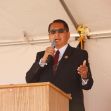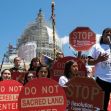When it comes to economic relief for Native American tribes under the Coronavirus Aid, Relief and Economic Security Act (CARES), the federal government giveth and the federal government taketh away. Although the Act provides $8 billion of its $150 billion Coronavirus Relief Fund to tribes, the data used to allocate their fair share of funds was found “clearly false” according to a federal judge. Now, the tribes are asking for justice. And a new filing shows they want help immediately.
The Prairie Band Potawatomi Nation of Kansas filed the most recent tribal motion for increased relief funds on May 25. They asked for a $4 million increase in their urgently needed COVID-19 relief funds because the government erred when calculating its population, even though the tribes had provided information on what methodology would provide accurate numbers.
The road to this new filing began with the structure of the CARES Act. Under the bill, which created a $150 Coronavirus Relief Fund, 574 Native American tribes were to receive $8 billion “to support tribes and tribal organizations in carrying out surveillance, epidemiology, laboratory capacity, infection control, mitigation, communication, and other COVID-19 preparedness and response activities” according to the Centers for Disease Control (CDC).
The Center on Budget and Policy Priorities called the allocation, “a historic federal recognition of tribal governments.” The Center also reported that, according to the Journal of Public Health Management and Practice, as of August 2020, people living on reservations were more than four times likelier to have COVID-19 than the U.S. population as a whole. In addition, they noted that the pandemic has also “crippled tribal revenues” due to closures of casinos and other tribal businesses.
Congress made it clear that CARES Act allocations are vital to the health and safety of Native American tribes. But it did not detail how the money should be divided to assure that every tribe is given a fair share of the government funds. The Treasury and Interior Departments consulted with tribal leaders twice to “solicit input” on how to distribute the money, according to a press release from the Prairie Band Potawatomi Nation. After the consultation, however, “inexplicably, the Treasury Department then proceeded to ignore all of the requested data.”
The CARES Act gave the Department of Treasury a “wide berth” to decide how to disburse the funds. But under former Treasury Secretary Steven Mnuchin, the population of several tribes was inaccurate, due to the use of a faulty population metric. For example, Treasury’s count of the Prairie Band’s population was 883, but its actual population is 4,516. A Department excel spreadsheet provided to the court in April was faulty for not using actual enrollment data. The difference amounts to a shortfall of $12.5 million according to the Tribe’s latest motion.
The Treasury Department’s errors were outlined in a report from Harvard Project on American Indian Economic Development. It concluded that “if the Treasury Department had utilized the Tribal enrollment data as originally requested, the Prairie Band would have received $10,327,948, or $7,631,673 more than actually received.” The report also showed that Prairie Band was in the “top 25” tribes that were “under-represented” by the Treasury’s use of the inappropriate formula. Many other tribes had even “harsher” results.
The same population counting errors were also the basis of a suit by the Shawnee tribe in Oklahoma, which argued that Mnuchin should not have used Indian Block Grant population data. That case was transferred to the D.C. District Court where U.S. District Judge Amit P. Mehta added another wrinkle when he ruled that he had no jurisdiction to review the case because the Administrative Procedures Act did not allow for the review of CARES Act decisions. His reasoning, however, was reversed by the D.C. Circuit that found the Treasury Department’s erroneous population data “probably” resulted in underpaying several tribes.
Then in April, the Shawnee Tribe, the Miccosukee Tribe of Florida and the Prairie Band Potawatomi Nation sued Janet Yellen, the new Secretary of the Treasury appointed by President Biden. They asked Mehta for an “immediate interim payment of undistributed CARES Act funds.” The Shawnee Nation had previously received an injunction that ordered the Treasury Department to withhold $12 million from being disbursed until its suit was decided on the merits.” The Prairie Band and Miccosukee Tribe requested orders requiring the Secretary to “make an immediate interim payment to each Plaintiff …and mandating that the amount of those interim payments be (1) based upon a rational consideration of the Tribes' population and (2) in line with the amount previously distributed to other Tribes similar in size.”
The tribes pointed out significant discrepancies in payment to the various tribes to support their request for a recount. For example, Prairie Band noted that their supplemental award provided just $225 for every uncounted citizen, while the Shawnee tribe received $1,721 for every tribe member missing from the Mnuchin count.
The current Treasury Department under Yellen, however, has announced that they are working on a “revised methodology for allocating the remaining funds within a matter of days—by April 30, 2021—and will disburse funds to Plaintiffs shortly thereafter.” Even though that date has passed, Mehta said “Although the court is sympathetic to the urgency of the matter, Treasury is making significant progress on a solution, which weighs against judicial intervention at this time.” He did, however, grant the two tribes’ motion to enjoin Treasury’s distribution of over $9 million, pending resolution of the relevant litigation.
Treasury’s missed deadline provided background for the May 25 filing by the Prairie Band Potawatomi Nation. It showed that the tribe does not want to wait. It asked the court to amend Mehta’s April injunction and to allocate $4 million now because the funds it received in 2021 are critical and are “a fraction of what is owed.” The tribe has strict guidelines for who can receive CARES Act funds. Recipients must have lived in Jackson County, Kansas, for a minimum of 30 days and have a loss of income directly related to COVID-19.
When they first refiled their lawsuit, Prairie Band Chairman Joseph Rupnick stated “It flies in the face of fundamental principles of federal Indian law and policy” to disregard Tribal enrollment data as a “barometer of a Tribal government’s service obligation to its people in favor of wildly inaccurate race-based housing data. But that is what happened. And it was arbitrary, capricious, and wrong.”
Yellen’s promise of a re-do could undo the counting error of the previous administration, but her timeline continues to delay the help that tribes say they urgently need to survive the pandemic.






